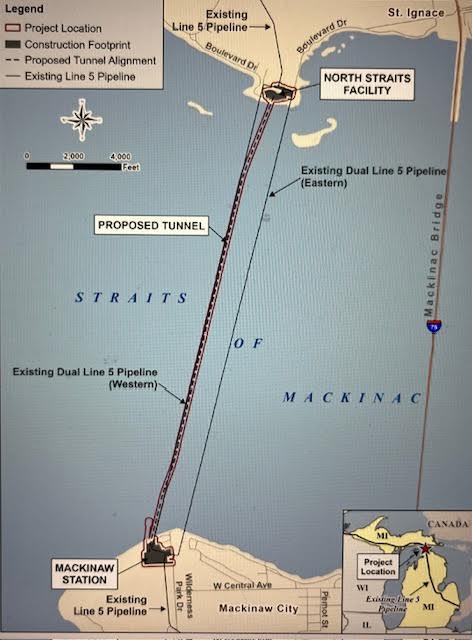By Jim Bloch
If you would like to make a public comment opposing or supporting the proposal by the Canadian oil and gas transportation giant Enbridge to build an oil and gas tunnel beneath the lakebed of the Straits of Mackinac, the deadline is Friday, Aug. 29.
The tunnel, to be drilled into the bedrock as deep as 300 feet below the Straits, would contain a new single pipeline, replacing the 72-year-old twin pipelines that now snake along the uneven bottomlands of the waterway.

The Michigan Department of Environment, Great Lakes and Energy began accepting public comments on July 16 on Enbridge’s plans to protect wetlands on the U.P. side of the project and its permits under the Great Lake Submerged Lands Act. Interested parties may submit comments by email to egle-enbridge-public-comments@michigan.gov.
Recent Enbridge wins
The Michigan Public Service Commission in December 2023 approved Enbridge’s request to move the aging twin pipes into a new concrete tunnel.
President Donald Trump meanwhile has fast-tracked the needed approval from the U.S. Army Corps of Engineers, which issued a draft environmental impact statement on the tunnel project in May. The Corps concluded that the tunnel project would cause some damage to vegetation and cultural practices, but it would protect the environment significantly better than the two alternatives that were considered – either covering the existing twin lines with gravel or doing nothing. The Corps plans to issue its final EIS later this fall or in 2026.
Line 5
The 645-mile Line 5 runs across Wisconsin into the Upper Peninsula in a 30-inch pipe that divides into two 20-inch pipes in the Straits and picks up again in the Lower Peninsula, running all the way to Marysville and under the St. Clair River to Sarnia’s Chemical Valley. It carries 540 barrels of light crude oil and natural gas liquids, used to make propane, per day through the 4.5 miles of twin pipelines.
The biggest fear of opponents is a rupture in the existing pipes or an explosion in a future tunnel that would contaminate Lake Huron and Lake Michigan, which are connected by the Straits.
The currents in the waterway are famous for switching direction, meaning that a spill would likely contaminate both lakes. A 2016 study by David Schwab at the University of Michigan found that 600 miles of coastline from the Beaver Island archipelago in northern Lake Michigan to Saginaw Bay in Lake Huron could be affected.
Schwab called the Straits “the worst possible place in the Great Lakes for a pipeline.”
Enbridge’s track record is dotted with problems. The company’s Line 6B ruptured in Talmadge Creek in 2010, dumping more than a million gallons of oil into a 40-mile stretch of the Kalamazoo River, one of the largest inland spills in American history.
Line 5 has experienced 33 spills totaling 1.1 million gallons since 1968, according to Oil and Water Don’t Mix, a consortium of groups and individuals opposed to Line 5. In 2018, an anchor strike dented both lines. A year later, an Enbridge contractor damaged stanchions that support the line.
In 2020, Governor Gretchen Whitmer formally terminated the 1953 easement agreement between Michigan and Enbridge that allowed the building of the twin pipelines.
“The easement is revoked for violation of the public trust doctrine, and terminated based on a longstanding, persistent pattern of noncompliance with easement conditions and the standard of due care imposed by the easement, which cannot be corrected or otherwise cured,” wrote Mark Totten, the governor’s chief legal counsel, to Enbridge Nov. 13, 2020.
Enbridge ignored the order.
Now opponents of the tunnel project, including environmental organizations and Indian tribes, are facing what looks like a last-ditch effort to stop the project.
“… a 2024 settlement between Enbridge, EGLE and the Bay Mills Indian Community requires the company to redo its water resources permit using the results of new wetlands surveys,” reported Kyle Davidson in the Michigan Advance July 19. Thus, the current comment period.
A challenge to Whitmer
Opponents of the tunnel delivered boxes of letters to Gov. Whitmer and held a press conference Aug. 26 to urge her to take a more active stand against the tunnel.
“Right now, we need Gov. Whitmer to do the right thing, and that means rejecting the Line 5 oil tunnel plan,” said Sean McBrearty, campaign coordinator for Oil & Water Don’t Mix. “Gov. Whitmer stood up against Big Oil when she revoked Enbridge’s easement to operate Line 5, and she has the chance to do the same thing today.”
Nichole Keway Biber, an organizer with Clean Water Action and a tribal citizen of Little Traverse Bay Bands of Odawa Indians, also spoke.
“Michigan’s 12 federally recognized Tribal Nations want to see Line 5 shut down because it is a direct threat to our sovereignty and way of life,” said Biber. “Our state government should respect treaties with Tribal Nations, not encourage 99 years more of foreign oil profits at the expense of our Great Lakes. We need to shut down Line 5 and reject Enbridge’s tunnel scheme.”
Enbridge responds
“Since the Michigan Department of Environment Great Lakes and Energy first granted these same permits four years ago, our team has made consistent progress in refining the project,” said Ryan Duffy, spokesperson for Enbridge, in an email to the Advance. “We’ve gathered extensive site-specific environmental data, which has been thoughtfully integrated into our updated application. We are confident in the quality and expertise of
our tunnel team and its environmentally respectful approach to building the tunnel. Our commitment to safeguarding the Great Lakes, preserving the environment, and supporting local communities remains at the heart of this project.”
Jim Bloch is a freelance writer based in St. Clair, Michigan. Contact him at bloch.jim@gmail.com.



